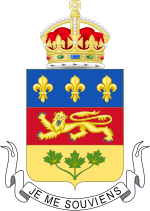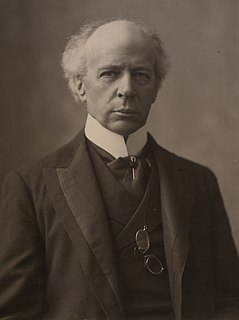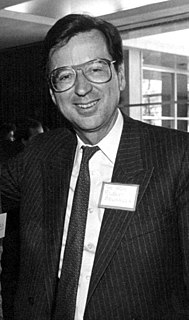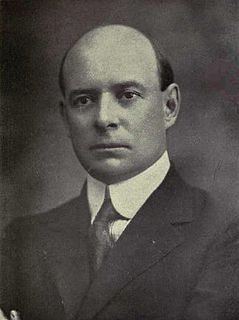| History of Quebec |
|---|
 |
| Timeline |
| Territory of Quebec |
|
| Topics |
| |
This section of the Timeline of Quebec history concerns the events relating to the province of Quebec, Canada between the beginning of the 20th century and the Westminster statute.
| History of Quebec |
|---|
 |
| Timeline |
| Territory of Quebec |
|
| Topics |
| |
This section of the Timeline of Quebec history concerns the events relating to the province of Quebec, Canada between the beginning of the 20th century and the Westminster statute.

Sir Henri Charles Wilfrid Laurier, was a Canadian lawyer, statesman, and politician who served as the seventh prime minister of Canada from 1896 to 1911. The first French Canadian prime minister, his 15-year tenure remains the longest unbroken term of office among Canadian prime ministers and his nearly 45 years of service in the House of Commons is a record for the House. Laurier is best known for his compromises between English and French Canada.

Robert Bourassa, was a Canadian lawyer and politician who served as the 22nd premier of Quebec from 1970 to 1976 and from 1985 to 1994. A member of the Liberal Party of Quebec, he served a total of just under 15 years as premier. Bourassa's tenure was marked by major events affecting Quebec, including the October Crisis and the Meech Lake and Charlottetown Accords.

The Quebec Liberal Party is a centrist provincial political party in Quebec. It has been independent of the federal Liberal Party of Canada since 1955. The QLP has always been associated with the colour red; each of their main opponents in different eras have been generally associated with the colour blue.

Joseph-Napoléon-Henri Bourassa was a French Canadian political leader and publisher. In 1899, Bourassa was outspoken against the British government's request for Canada to send a militia to fight for Britain in the Second Boer War. Prime Minister Sir Wilfrid Laurier's compromise was to send a volunteer force, but the seeds were sown for future conscription protests during the World Wars of the next half-century. Bourassa unsuccessfully challenged the proposal to build warships to help protect the empire. He led the opposition to conscription during World War I and argued that Canada's interests were not at stake. He opposed Catholic bishops who defended military support of Britain and its allies. Bourassa was an ideological father of French-Canadian nationalism. Bourassa was also a defining force in forging French Canada's attitude to the Canadian Confederation of 1867.

Daniel Johnson Jr., is a former Canadian politician. He was a member of the Liberal Party of Quebec and was the 25th premier of Quebec for nine months in 1994 until his party's defeat in the provincial general election.

The Conscription Crisis of 1917 was a political and military crisis in Canada during World War I. It was mainly caused by disagreement on whether men should be conscripted to fight in the war, but also brought out many issues regarding relations between French Canadians and English Canadians. Almost all French Canadians opposed conscription; they felt that they had no particular loyalty to either Britain or France. Led by Henri Bourassa, they felt their only loyalty was to Canada. English Canadians supported the war effort as they felt stronger ties to the British Empire. On January 1, 1918, the Unionist government began to enforce the Military Service Act. The act caused 404,385 men to be liable for military service, from which 385,510 sought exemption.

Le Devoir is a French-language newspaper published in Montreal and distributed in Quebec and throughout Canada. It was founded by journalist, politician, and nationalist Henri Bourassa in 1910.

Joseph-Adélard Godbout was a Canadian agronomist and politician. He served as the 15th premier of Quebec briefly in 1936, and again from 1939 to 1944. He served as leader of the Parti Libéral du Québec (PLQ).

Louis-Alexandre Taschereau was the 14th premier of Quebec from 1920 to 1936. He was elected four times, the first in 1900, in the riding of Montmorency. He was also a member of the Parti libéral du Québec.

This section of the Timeline of Quebec history concerns the events relating to the province of Quebec, Canada between the enactment of the British North America Act of 1867 and the end of the 19th century.

This section of the Timeline of Quebec history concerns the events relating to the province of Quebec, Canada between the Westminster statute and the "Quiet Revolution."

This section of the Timeline of Quebec history concerns the events between the Quiet Revolution and the patriation of the British North America Act.
The Bloc populaire canadien, often shortened to the Bloc populaire or the Bloc, was a political party in the Canadian province of Quebec from 1942 to 1947. It was founded on September 8, 1942 by opponents of conscription during the Second World War. The party ran candidates at both federal and provincial levels.
The Unionist Party was a centre-right historical political party in Canada, composed primarily of former members of the Conservative party with some individual Liberal Members of Parliament. It was formed in 1917 by MPs who supported the "Union government" formed by Sir Robert Borden during the First World War, who formed the government through the final years of the war, and was a proponent of conscription. It was opposed by the remaining Liberal MPs, who sat as the official opposition.
The Conservative Party of Quebec was a political party in Quebec, Canada, from 1867 until 1936, when it merged with members of the Action libérale nationale to form the Union Nationale.

Rodolphe Lemieux was a Canadian parliamentarian and long time Speaker of the House of Commons of Canada (1922–1930).

Albert Sévigny, was a Canadian politician.

Armand Renaud Lavergne, or La Vergne was a Quebec lawyer, journalist and political figure. He represented Montmagny in the House of Commons of Canada as a Liberal member from 1904 to 1908 and as a Conservative member from 1930 to 1935. He represented Montmagny in the Legislative Assembly of Quebec as a Nationalist member from 1908 to 1916. His surname is given as "La Vergne" by some authoritative sources, including his National Assembly of Quebec biographical page, although these same sources spell his father's name as "Lavergne".

Joseph-Edmond-André Laurendeau was a journalist, politician, co-chair of the Royal Commission on Bilingualism and Biculturalism, and playwright in Quebec, Canada. He is usually referred to as André Laurendeau. He was active in Québécois life, in various spheres and capacities, for three decades. Laurendeau's career also "spanned the most turbulent periods in the history of Canada".
Roger Lapointe is a Canadian politician in the province of Quebec. He was a Liberal member of the National Assembly of Quebec from 1973 to 1976 and has been the mayor of Mont-Saint-Michel since 1997.